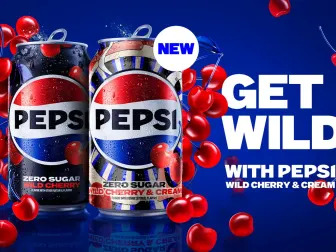January 23, 2025

This story was originally published on Food Dive . To receive daily news and insights, subscribe to our free daily Food Dive newsletter .
Leftovers is our look at a few of the product ideas popping up everywhere. Some are intriguing, some sound amazing and some are the kinds of ideas we would never dream of. We can’t write about everything that we get pitched, so here are some leftovers pulled from our inboxes.
Pepsi is turning to two popular soda flavors and bringing them together for its first permanent flavor in four years.
The soft drink is combining the nostalgic duo of ripe wild cherry and creamy vanilla for Pepsi Wild Cherry & Cream. The beverage and snack giant described the soda as having a “sweet, fruity effervescence [that] is followed by a smooth, creamy vanilla swirl.”
Pepsi Wild Cherry & Cream debuted nationwide on Jan. 20. The offering, which comes in full and zero-sugar varieties, are available permanently in 12-ounce cans and for a limited time in 20-ounce bottles.
The new flavor is the first permanent launch for Pepsi since Mango in 2021, which is being discontinued .
“This permanent addition to our portfolio boasts a unique profile that’s both indulgent and refreshing,” Jenny Danzi, head of marketing for Pepsi, said in a statement. “With 2025 trends bubbling up on all things cherry, we’re confident Pepsi Wild Cherry & Cream will be a serious hit with fans this year!"
Danzi noted that Pepsi Wild Cherry, which the company launched in 1988, has been popular, especially among millennial and Gen Z cola fans, posting 8% growth year over year.
By combining the cherry and vanilla flavors, PepsiCo is giving consumers a new offering from the nostalgia wave that is increasingly popular with consumers today. The new flavor also provides the company with another way to draw younger shoppers into the brand who will be responsible for a greater portion of the company’s sales going forward.
The launch comes less than a year after Coke discontinued its own Cherry Vanilla soda .
— Christopher Doering
Töst has debuted a new canned format after previously available only in bottles as it aims to grow its presence within nonalcoholic beverages.
Last year, Corona brewer Constellation Brands acquired a minority stake in the beverage.
“After testing can formats at experiential events and in arenas and sporting venues ... we’ve found that the canned format opens up a whole new world of possibilities,” Töst CEO Brooks Addington said in a statement.
The sparkling beverage brand comes in two varieties: its original blend, containing white tea, cranberry and ginger; and Rosé, with white tea, ginger and elderberry.
Töst pitches itself as a way for adult drinkers to enjoy a premium cocktail-style drink without the booze. The alcohol-free cocktail market is projected to grow at a compound annual growth rate of 5.7% by 2030, according to Grand View Research .
Other brands in the segment have grown in popularity from consumers looking to moderate their drinking, or abstain altogether, including Mingle Mocktails and Molson Coors’ Roxie .
— Chris Casey
A water manufacturer is turning to a new formulation to attract protein-hungry consumers.
Protein2o said its drink, which has between 15 and 20 grams of whey protein isolate, now contains a blend of 350 electrolytes along with vitamins B5 and B6.
Protein2o was aimed at athletes when it debuted in 2013. This predated the heightened demand for protein-infused products that have emerged during the last five years.
The market for protein water alone — products classified as water that contain protein ingredients — is projected to increase to $2.6 billion by 2033, a compound annual growth rate of 8.3%, according to Fortune Market Insights .
The brand described its tenure so far as “under-the-radar” but says its new formulations and packaging will resonate with a new group of consumers.
“We know that protein is the core ingredient in muscle building and muscle recovery and with this new product formula, we are giving those pursuing fitness goals, a refreshing and delicious drink,” said Jack Peters, senior brand manager at Protein2o.
With the added electrolytes, Protein2o also is leaning into the growing desire by consumers for hydration drinks after a workout or to nurse a hangover.
Some CPG companies are debuting new protein drinks for consumers taking GLP-1 medications. In December, Nestlé’s Boost Brand launched a pre-meal drink containing 10 grams of protein and 45 calories per serving.
— Chris Casey
Recommended Reading